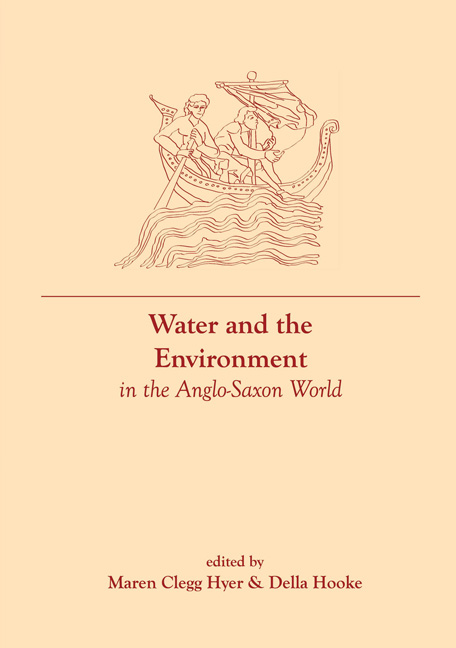Book contents
- Frontmatter
- Dedication
- Contents
- List of Illustrations
- List of Tables
- List of Contributors
- Introduction
- 1 From Whale's Road to Water under the Earth: Water in Anglo-Saxon Poetry
- 2 Water in the Landscape: Charters, Laws and Place Names
- 3 Fens and Frontiers
- 4 Marshlands and Other Wetlands
- 5 Rivers, Wells and Springs in Anglo-Saxon England: Water in Sacred and Mystical Contexts
- 6 Food from the Water: Fishing
- 7 Inland Waterways and Coastal Transport: Landing Places, Canals and Bridges
- 8 Watermills and Waterwheels
- 9 Water, Wics and Burhs
- Notes
- Suggested Reading
- Index
7 - Inland Waterways and Coastal Transport: Landing Places, Canals and Bridges
- Frontmatter
- Dedication
- Contents
- List of Illustrations
- List of Tables
- List of Contributors
- Introduction
- 1 From Whale's Road to Water under the Earth: Water in Anglo-Saxon Poetry
- 2 Water in the Landscape: Charters, Laws and Place Names
- 3 Fens and Frontiers
- 4 Marshlands and Other Wetlands
- 5 Rivers, Wells and Springs in Anglo-Saxon England: Water in Sacred and Mystical Contexts
- 6 Food from the Water: Fishing
- 7 Inland Waterways and Coastal Transport: Landing Places, Canals and Bridges
- 8 Watermills and Waterwheels
- 9 Water, Wics and Burhs
- Notes
- Suggested Reading
- Index
Summary
Ego ascendo nauem cum mercibus meis, et nauigo ultra marinas partes, et uendo meas res et emo res pretiosas, que in hac terra non nascuntur.
I board my ship with my cargo and sail to overseas lands, and sell my goods and buy precious things which are not made in this country. (Ælfric's Colloquy)
To appreciate the experience of the Anglo-Saxons one needs to think oneself into another world in which water was a major, perhaps the major, means of communication, where its characteristics were vital to trade and to agriculture.
In the passage above, David Pelteret expressed a suspicion which some historians of the early Middle Ages have long harboured: in a period when little effort was expended on maintaining roads, water transport offered a faster, more reliable and perhaps even a more commonly used means of moving around. Yet, before we accept the idea that this was ‘the major means of communication’, we need to bear in mind that water transport was not without its own difficulties. There was an equal lack of investment in keeping rivers clear of obstruction and providing for mariners the basic infrastructure for passage at sea, including lights or other sea-marks. The reality may have been that the problems for boatmen and shipmasters were equal to or even greater than those experienced by horsemen and carters. This chapter seeks to evaluate the evidence for and importance of water transport in Anglo-Saxon England, considering not only the practicalities of moving around on the rivers and sea, but also the facilities on land associated with watery environments, including landing places, bridges and causeways. Ships and boats are not discussed at any length since the evidence for these has been recently and very adequately summarized.
The core problem is to determine whether boats and ships were widely used for the daily movement of people and goods. References in the Anglo-Saxon Chronicle to boats or the preparation of fleets give little impression of the frequency of everyday usage: they were connected with events that were worthy of particular note. Equally, we cannot draw conclusions from the number of finds of ancient boats.
- Type
- Chapter
- Information
- Water and the Environment in the Anglo-Saxon World , pp. 152 - 166Publisher: Liverpool University PressPrint publication year: 2017



